Interview: Film Professor and Director Marty Lang On Teaching and Making Films
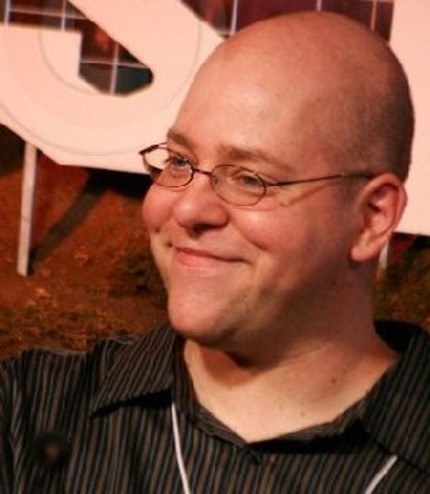
Rising Star is an independent film that recently won two Awards at the Seattle True Independent Film Festival, including Best Premiere for drawing the biggest audience and Best On-Screen Romance. I had the joy of seeing and reviewing it earlier this year, and found myself enjoying the charming and light-hearted romantic comedy a lot. So it was with pleasure that I spoke with the film's director - Professor Marty Lang.
Marty, congratulations on the success of your new film Rising Star at the Seattle True Independent Film Festival where it had its World Premiere. What gave you the inspiration to make this film in the first place?
Thanks for the congratulations! The inspiration for Rising Star came from a few places. The first was my own work situation. Since I graduated from college in 1999, I've been laid off five times. I've never held a job for longer than three years. Being laid off sucks. And the threat of being laid off is almost worse. You spend every minute of every day wondering if today is the day, how much more time you have at the job, and how long you can last if you do get laid off. Living with the threat of being laid off is an all-consuming thing, and when I dealt with that, I focused all my energy on work, to the detriment of hobbies and things I loved, like writing, basketball, and making movies. I wanted to tell a story about that type of stress, since I had never seen one before.
I also got inspiration by watching a movie called Medicine for Melancholy, a great indie film that deals with two lovers in San Francisco, California. That film really featured San Francisco as a character in the movie, and it presented a political issue (gentrification of the city) as a backdrop to a romantic story. That really resonated with me, and I started thinking of how I could do something like that in Hartford, Connecticut. Put those two things together, and that was the inspiration.
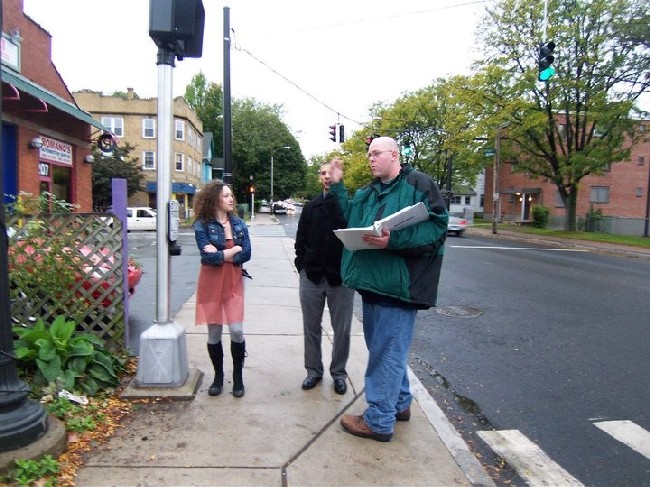
So what does Connecticut, where the film is entirely set, mean to you both personally and professionally?
Connecticut means so much to me personally and professionally. Personally, I was born and grew up here, and my family and friends are here. I've lived in California and Florida, but I've always come back home to Connecticut. And professionally, the state means everything to me. When I was about to graduate film school, I got a job offer at a management company in Los Angeles, but I gave it up to come home because I saw the film industry was starting to blossom here. I've ridden that wave ever since, working on films here, teaching film here, and making my own independent work here.
Tell us about some of the difficulties you faced in the making of Rising Star and how you overcame them.
The biggest challenge, as with most films, was coming up with the money to finance it. We were fortunate to raise over $15,000 on Kickstarter for the movie, and we were fiscally sponsored by the IFP, but we were still short on money. We had two official "investors," but I ended up putting in about half the money to finish the film. Luckily, I was working at the time, so I could do it. I'm not sure I could do that again.
Other than that, I think our other big challenge was in post-production. Working on such a tiny budget meant that we had to wait for our people to finish their other projects that paid better, and that definitely slowed things down. Post took a little over a year to complete, which drove me up a wall, but it was necessary. Now that it's done, I'm glad we took the time we did. Even though it took forever, it was made right.
Why did you choose to use crowdfunding to raise the money to make your movie, and what are some of the good and bad things about this method of funding a film?
We knew that it would be very hard to find traditional investors for this movie, because it doesn't have any bankable movie stars in it, and I was a first time feature director. So we decided to use Kickstarter to raise some of our budget. The best thing about crowdfunding is that it helps you to build an audience before your product is even completed. We've been able to find so many people who support us, and in many cases, have become our friends. People are always asking me now about the movie, where it's playing, when they can see it on TV, and it's because they found out about us through crowdfunding. The bad thing about crowdfunding, though, is that it is an all-consuming activity. Our campaign ran 45 days, and I was at the computer all day, every day. It became more than a full time job. If you're interested in getting into crowdfunding, that's something you really need to understand. This is not easy at all. It can be rewarding, but it is hard work.
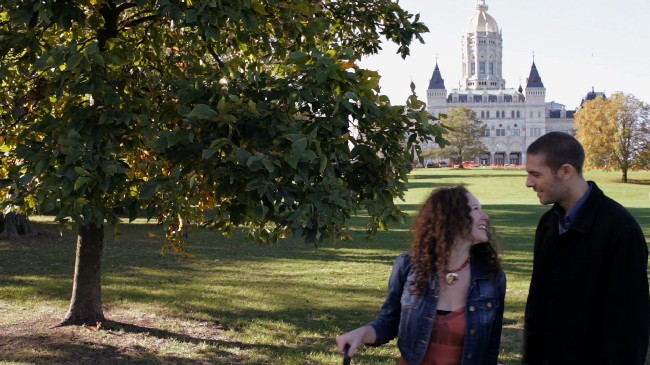
You got to work with a wonderful cast in the film: Gary Ploski and Emily Morse are very sweet as a couple, and Michael Barra just effortlessly makes the audience laugh. Tell us a bit about the casting process and what it was like working with this cast.
The casting process for Rising Star was the easiest thing in the world ... because there really wasn't one. When I wrote the script, I wrote it with all my friends in mind. Every major speaking part in this movie was written for an actor/actress friend of mine. I had worked with Gary on a number of short films before this, and he worked as a producer on the film, so we worked from the beginning to help shape his character. Emily and I worked together on two short films before this, and we went to college together too, so I knew she'd be perfect for Alyza. I was really lucky that when they met and started working together, that sweet chemistry was there. As for Michael, I produced his first feature, and I knew how funny he was, so I wrote his character to provide opportunities for humor. And then he added a bunch more.
The casting for this movie was a little unorthodox, but I think it worked out really well.
I understand you are a Professor of Film at Quinnipiac University. Did you find it easy to put theories into practice when you were making Rising Star, your first feature film as a director?
I spent the last year as a Visiting Professor of Film, Video and Interactive Media at Quinnipiac, and my experience as a teacher was invaluable to me while directing Rising Star. Teaching any film class means you have to be knowledgeable about every aspect of filmmaking, and to be honest, there were some I didn't completely understand before I started. Students can smell a fraud really quickly, so it was important to me that I really study everything and understand it all. It helped me as a teacher, and it really helped me as a director.
Does it put you under extra pressure to make good films knowing that your students are probably going to watch and judge them?
It doesn't bother me at all. The biggest thing students can get out of watching my work is seeing that it isn't perfect. That way, they can point out those things, and we can talk about them. I've showed my classes different cuts of Rising Star as it went through the editing process, and then showed them the finished version, so that they can see how the film changes, and comes together as it goes through post-production. I guess some teachers might be uptight about showing their own work to students, but it doesn't bug me. I show my students a short I acted in called To Dye For (https://vimeo.com/19265095), and in this film I run around in nothing but a towel. The kids get a good laugh about it, but we also get into good conversations about how the film was edited, how it was written, things like that. That's the most important thing to me: showing the kids films I've worked on, because I know how they were made.
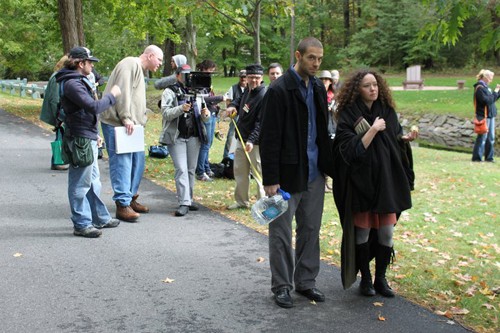 What do you like and dislike the most about being an independent filmmaker?
What do you like and dislike the most about being an independent filmmaker?I love the family atmosphere that independent film can engender. The majority of our crew came from Connecticut, and had come through the Connecticut Film Industry Training Program, so we all knew each other, and we all worked together to get this little movie made. I made friendships on that movie I'll probably have the rest of my life. The thing I don't like is that when you make independent films, you have to deal in currencies other than money. Since you don't have any, you make deals that involve bartering, reciprocal work on other projects, etc. Those things take up time - so much time, I'm still repaying them two years later. It's a necessary evil to get an indie film made, but it's not something I love.
One of the challenges faced by the character of Chris (Gary Ploski) in Rising Star is
finding the balance between work and hobbies. Is that something you have had to deal with a lot, and how do you try to achieve that balance?
It's always been a challenge for me to find a balance between my work and hobbies. I tend to focus heavily on one or the other, depending on where my life is; if I'm working, I dive into my work, and if I'm not working (or while I was a student), I've focused much more on hobbies of mine. I keep thinking that I can solve the problem by making my hobbies into a job. (I played basketball in college, and I figured if I played professionally, that would solve the problem. And now, I think that if I can become a professional filmmaker, that would also solve the problem.) But I haven't been able to do that yet, so I try to deal with it one day at a time, and try to carve out time for both things. It's hard. But I'm trying.
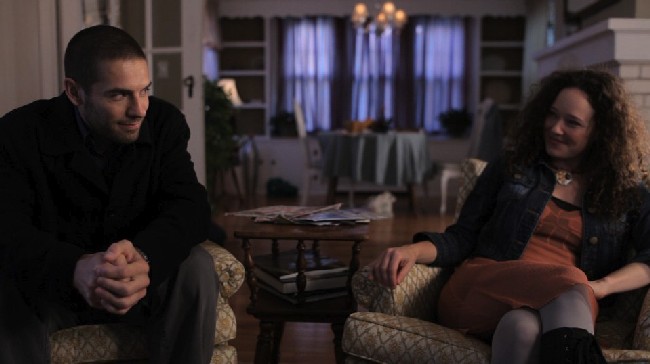
As someone who both teaches and creates films, I am curious to find out what your all-time favorite movies are.
I love films that have a dark sense of humor. Some of my favorite films are The Big Lebowski, American Beauty, Pulp Fiction and Fight Club. I also love The Godfather, Raging Bull and The Battle of Algiers.
If you get given an unlimited budget and complete creative freedom to make one film of your choice, what kind of film would it be, and why?
I have an idea for a movie that's not the most commercially viable story in the world, but one that addresses something millions of Americans are now dealing with: student loan debt. It's a movie that's close in tone and style to Fight Club; a black comedy with an angry, socialist-liberal political undertone to it. It's based on my own experiences with paying off $100,000 of student loans, something I wouldn't wish on my worst enemy. I don't think it would cost an extraordinary amount; it's the creative freedom I'd want a lot more. I'd want to make it because this is the story that's most defined my life - paying that much back in loans has affected me in everything I do. I'd want the chance to tell it with the resources the story would deserve.
Finally, what advice would you give to aspiring filmmakers?
My advice to aspiring filmmakers? Make films. Short films, sketches, Web videos, features, it doesn't matter. Just shoot. The more you shoot, the more you'll figure out how it works. It could be in film school, or it could be out with your friends on weekends. Just make films.

Do you feel this content is inappropriate or infringes upon your rights? Click here to report it, or see our DMCA policy.






